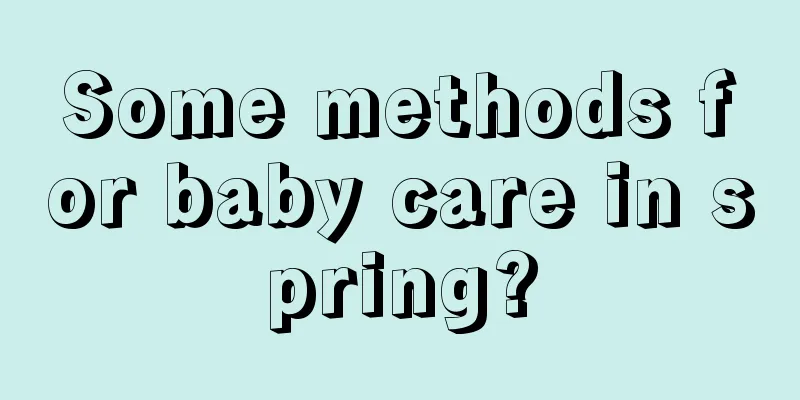Is the pediatric emergency room infectious?

|
Roseola infantum is a common disease among children. This disease not only causes certain pain to the children themselves, but can also be transmitted to other children through certain channels. Therefore, when your child is infected with roseola infantum, parents should not only take the child for treatment in time, but also protect and isolate the child to prevent other children from being infected with roseola infantum. 1. Is roseola infantum contagious? Roseola infantum is an acute exanthematous infectious disease. So roseola infantum is contagious. Generally speaking, roseola infantum is mostly transmitted through saliva brought out from the respiratory tract. If the baby's resistance is weak and he or she is in contact with a sick baby for a long time, he or she is likely to be infected. Therefore, for the health of the baby, it is necessary to isolate the baby in time and avoid contact with sick babies. However, roseola infantum is not highly contagious. Although it is contagious, the chance of an infant being infected is low, so parents do not need to worry too much. And for babies under two years old. The contact time with other babies will not be long, so the probability of infection is lower. Roseola infantum is contagious, but parents can prevent infection. Strengthen exercise, improve the baby's immunity and resistance, keep the baby's living environment tidy and clean, and avoid excessive contact with other babies. These are all ways to prevent the baby from being infected. Even if the baby is infected, there is no need to worry. During the rash process, with enhanced care, the baby will be able to recover healthily on its own later without any impact on the baby. 2. Transmission routes of roseola infantum First of all, to be infected there must be a source of infection. The source of infection is the sick baby. If your baby has not come into contact with other babies, then you don’t have to worry about being infected. If roseola infantum occurs, it is caused by the virus invading the body, not by infection. Secondly, the most direct way of transmission of roseola infantum is droplets. Generally speaking, infectious diseases are transmitted to other people through droplets, and roseola infantum is no exception. If the baby has close contact with the source of infection, the chance of being infected through droplets is very high. In addition, there is another way of transmission is through the air. The probability of transmission through the air is very small because roseola infantum is not highly contagious and the germs stay in the air for too long to be transmitted to other people. Although roseola infantum is an infectious disease, most babies become ill due to viral invasion. Since the disease is not common due to infection, parents only need to be careful not to let their babies come into too close contact with other babies. If symptoms of roseola infantum appear, just provide good care. Roseola infantum can heal on its own and does not require medical treatment. 3. How long is roseola infantum contagious? How long is roseola infantum contagious? This is related to the baby's physical condition. Some strong babies may only need to be isolated for about three more days, but some babies may need to be isolated for about a week before they are through the infectious period. According to current medical case statistics, more than 90% of babies' roseola infantum is contagious for about five days. For safety reasons, parents are advised to wait about a week before going out to avoid infecting other babies. The infectious period of roseola infantum is about one week. However, roseola infantum is not highly contagious, and the number of cases of roseola infantum due to infection is not large, so parents do not need to worry about whether it will be transmitted to other babies or be infected by other babies. Generally speaking, most cases of roseola infantum are spontaneous and caused by viral invasion. During the period of roseola infantum, isolation and care are sufficient. Overall, the issue of the contagious period of roseola infantum is not very meaningful. Even if the infection causes roseola infantum, the baby will recover on its own in about ten days, because roseola infantum itself is a self-healing disease and will not occur again after recovery. |
<<: The fastest treatment for Ganji in children
>>: Can children be given a bath in the emergency room?
Recommend
What should I do if my child has cavities?
Children are still very young and very ignorant, ...
What should I do if my nine-month-old baby is constipated?
Most babies have been weaned and are starting to ...
What to do if your child has high blood pressure
High blood pressure is a very common disease. Thi...
What to do if children have allergic rhinitis?
Children generally have poor resistance, so they ...
There are 9 dietary taboos for children with mycoplasma infection
Mycoplasma infection in children is a relatively ...
How to solve the problem of a three-month-old baby sucking his fingers
Many parents will find a phenomenon that their ba...
What is going on when my child keeps having a fever?
I don’t know if you have ever encountered a situa...
Behavioral habit formation education
Behavioral habits are what parents should focus o...
What are the clinical manifestations of precocious puberty?
Due to the fact that the current social life, die...
What should I do if my child has a fever and refuses to drink water?
Once a child feels unwell or has a fever, parents...
What are the diets for children with asthma?
Infants and young children have poor resistance a...
Sleep time and precautions for seven-month-old babies
A seven-month-old baby is in a critical stage of ...
What are the precautions for baby travel?
Autumn is the best time to travel. Autumn is comi...
What to do if your baby has a fever in spring
Spring is a season that we all like very much. Sp...
What are the symptoms of rhinitis in children?
Children are the treasures of every family. Some ...









